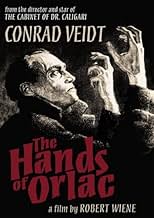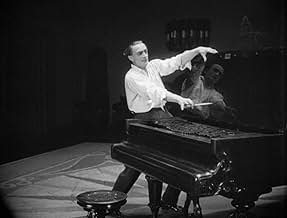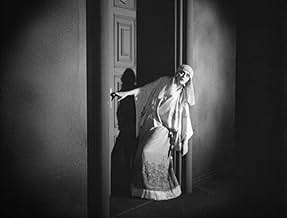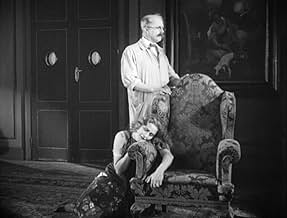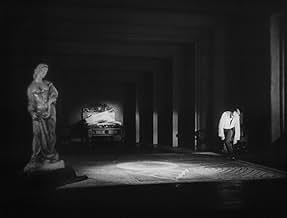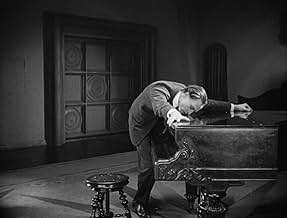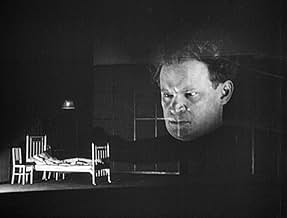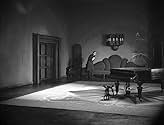IMDb RATING
7.0/10
3.7K
YOUR RATING
A world-famous pianist loses both hands in an accident. When new hands are grafted on, he doesn't know they once belonged to a murderer.A world-famous pianist loses both hands in an accident. When new hands are grafted on, he doesn't know they once belonged to a murderer.A world-famous pianist loses both hands in an accident. When new hands are grafted on, he doesn't know they once belonged to a murderer.
Conrad Veidt
- Paul Orlac
- (as Veidt)
Alexandra Sorina
- Yvonne Orlac
- (as Sorina)
Fritz Strassny
- Der alte Orlac
- (as Strassny)
Paul Askonas
- Der Diener
- (as Askonas)
Carmen Cartellieri
- Regine
- (as Cartellieri)
Hans Homma
- Dr. Serral
- (as Homma)
Fritz Kortner
- Nera
- (as Kortner)
- Director
- Writers
- All cast & crew
- Production, box office & more at IMDbPro
Featured reviews
A famous pianist (Conrad Veidt) has his hands crushed in a train accident, and he receives new ones through an experimental transplant. But whose hands were they before? The hands of a killer!
This is a rather long film, probably more than it needs to be. The train wreck shots are beautiful, but go on a while, with the story being relatively simple.
The focus here is more on Orlac's mental state, and less on the others in any way, with the love affair angle of "Mad Love" (its remake) completely absent. For fans of "Mad Love", this picture needs to be respected, as they clearly borrowed scenes (noticeably where Orlac meets his donor), but "Mad Love" is the superior film in many ways.
This is a rather long film, probably more than it needs to be. The train wreck shots are beautiful, but go on a while, with the story being relatively simple.
The focus here is more on Orlac's mental state, and less on the others in any way, with the love affair angle of "Mad Love" (its remake) completely absent. For fans of "Mad Love", this picture needs to be respected, as they clearly borrowed scenes (noticeably where Orlac meets his donor), but "Mad Love" is the superior film in many ways.
I'm glad I had this chance to check out yet another German Expressionist classic even if I had to make do with faint Spanish subtitles over the original German intertitles (then again, the narrative is easy enough to follow)! It took me some time to warm up to the film: the pace is extremely sluggish (the aftermath of the train-wreck at the beginning seemed interminable), while the all-important decision to exchange the damaged hands of famed concert pianist Orlac with those of a murderer felt too abrupt.
In preparation for this review, I re-read Michael Elliott's comments on the film: while I generally concur with his opinion, at this stage I wouldn't put this above the 1935 Karl Freund/Peter Lorre/Colin Clive remake MAD LOVE (Ted Healy's intrusive comedy relief, to me, is just about the only negative element in that film while adding Dr. Gogol's obsessive yearning for Orlac's wife, hence the new title). Still, I was surprised by how much the later film actually followed the Silent version especially the two scenes in which Orlac meets the 'executed' murderer of the Maurice Renard story; another remake appeared in 1960, co-starring Christopher Lee and which I watched on Italian TV not too long ago but already can hardly remember anything about it!
Conrad Veidt's lanky figure and stylized approach to acting perfectly suited the requirements of the leading role (his posture generally echoing that of Cesare the Somnambulist in the same director's THE CABINET OF DR. CALIGARI [1919]); the expressionist sets were also notable but the film's style is generally an internalized one in that it deals primarily with Orlac's state of mind filming him in tight shots whenever possible. However, the avant-garde score which accompanied the Grapevine Video edition I watched was a matter of taste featuring a female vocalist who frequently attempted to simulate the various characters' emotions with an annoying array of wails, shrieks and faint whispers!
It's unfortunate, too, that the backlog I have of unwatched films on DVD doesn't permit me to check out the Kino edition of CALIGARI for the moment especially since it contains a lengthy condensed version of another intriguing Wiene title, GENUINE: A TALE OF A VAMPIRE (1920)
In preparation for this review, I re-read Michael Elliott's comments on the film: while I generally concur with his opinion, at this stage I wouldn't put this above the 1935 Karl Freund/Peter Lorre/Colin Clive remake MAD LOVE (Ted Healy's intrusive comedy relief, to me, is just about the only negative element in that film while adding Dr. Gogol's obsessive yearning for Orlac's wife, hence the new title). Still, I was surprised by how much the later film actually followed the Silent version especially the two scenes in which Orlac meets the 'executed' murderer of the Maurice Renard story; another remake appeared in 1960, co-starring Christopher Lee and which I watched on Italian TV not too long ago but already can hardly remember anything about it!
Conrad Veidt's lanky figure and stylized approach to acting perfectly suited the requirements of the leading role (his posture generally echoing that of Cesare the Somnambulist in the same director's THE CABINET OF DR. CALIGARI [1919]); the expressionist sets were also notable but the film's style is generally an internalized one in that it deals primarily with Orlac's state of mind filming him in tight shots whenever possible. However, the avant-garde score which accompanied the Grapevine Video edition I watched was a matter of taste featuring a female vocalist who frequently attempted to simulate the various characters' emotions with an annoying array of wails, shrieks and faint whispers!
It's unfortunate, too, that the backlog I have of unwatched films on DVD doesn't permit me to check out the Kino edition of CALIGARI for the moment especially since it contains a lengthy condensed version of another intriguing Wiene title, GENUINE: A TALE OF A VAMPIRE (1920)
This is not a great movie, I admit. Certainly the acting is bizarre (though often moving) and the rhythm takes getting used to. But I thought I would put in a good word based on a recent viewing experience. I am not rating it high but I really enjoyed it a lot.
6 or 7 years ago I went on a Conrad Veidt spree and bought copies of some his silents from an ebay seller/devotee. The quality varied and I recall that he particularly apologized for this item, which was barely viewable. All you could really see was Veidt's face... The other night TCM showed the Kino restoration and I sat down to see the film "for real." It was a pleasure to be able to take in the wonderful decors and costumes, and to get a relatively coherent version of the plot. The train wreck scene is stirring. And Veidt's face, again, as he progresses from sensitive soul to tormented monstrosity... In short, it was very rewarding.
6 or 7 years ago I went on a Conrad Veidt spree and bought copies of some his silents from an ebay seller/devotee. The quality varied and I recall that he particularly apologized for this item, which was barely viewable. All you could really see was Veidt's face... The other night TCM showed the Kino restoration and I sat down to see the film "for real." It was a pleasure to be able to take in the wonderful decors and costumes, and to get a relatively coherent version of the plot. The train wreck scene is stirring. And Veidt's face, again, as he progresses from sensitive soul to tormented monstrosity... In short, it was very rewarding.
Director Robert Wiene and star Conrad Veidt reteam for this Austrian horror suspense drama. Veidt plays Paul Orlac, a famous concert pianist who gets severely injured in a train crash. Dr. Serral (Hans Homma) tries an experimental technique wherein he grafts the hands of a dead man onto Orlac's arms, and the surgery is a success, but afterward, when Orlac learns that the hands belonged to an executed murderer, he starts to lose his mind, believing that the hands are commanding him to kill again. Also featuring Alexandra Sorina, Fritz Strassny, Paul Askonas, Carmen Cartellieri, and Fritz Kortner.
Wiene continues to use Expressionistic techniques and visual schemes, but they are toned down, and used to accentuate the narrative rather than overwhelming the proceedings. The film marks an important step in the transition from purely arthouse Expressionism to the techniques used in the visual language of film noir. Veidt gives an intense, tortured performance, although Kortner pales in comparison to the later remake Mad Love and Peter Lorre's take on the character. Most sources list this as being roughly 90 minutes, but the version I watched was 113 minutes. I felt that could have been trimmed down a bit, as some scenes dragged. That being said, I enjoyed the film quite a bit, and the cinematography was beautiful.
Wiene continues to use Expressionistic techniques and visual schemes, but they are toned down, and used to accentuate the narrative rather than overwhelming the proceedings. The film marks an important step in the transition from purely arthouse Expressionism to the techniques used in the visual language of film noir. Veidt gives an intense, tortured performance, although Kortner pales in comparison to the later remake Mad Love and Peter Lorre's take on the character. Most sources list this as being roughly 90 minutes, but the version I watched was 113 minutes. I felt that could have been trimmed down a bit, as some scenes dragged. That being said, I enjoyed the film quite a bit, and the cinematography was beautiful.
Interesting and well made German silent version of Maurice Renard's novel "Les Mains d'Orlac" from the same folks behind the highly regarded expressionist classic THE CABINET OF DR. CALIGARI (1920). Conrad Veidt gives an outstanding, creepy and memorable dramatic performance as the tormented Orlac, a famous pianist whose hands are replaced by those of an executed thief and murderer after a train accident. He soon begins to think he's not only received a maniac's hands, but also his desire to commit crimes. The cavernous and sparsely decorated interiors as well as the typically exaggerated performances often give this the feel of a theatrical production, and while the movie is a little overlong and slow-going (definitely requires a more patient type of viewer to appreciate it), it's still worthwhile for Veidt's amazing performance, some nice visuals and a surprise twist ending. I also need to point out that the Kino DVD of the film runs 110 minutes, though it is listed here as running just 98. Bonus features on the disc include scene comparisons of domestic and international cuts, excerpts of Renard's Novel, an essay by author John Soister, a trailer and an image gallery.
The same tale would later be the basis for 1935's MAD LOVE (starring the inimitable Peter Lorre) and 1960's THE HANDS OF ORLAC (starring Mel Ferrer, and also with supporting turns from Christopher Lee and Donald Pleasence), as well as the uncredited basis for 1962's HANDS OF A STRANGER and several other films.
The same tale would later be the basis for 1935's MAD LOVE (starring the inimitable Peter Lorre) and 1960's THE HANDS OF ORLAC (starring Mel Ferrer, and also with supporting turns from Christopher Lee and Donald Pleasence), as well as the uncredited basis for 1962's HANDS OF A STRANGER and several other films.
Did you know
- TriviaThis film was incomplete for decades, due to footage that never made it into the American prints and footage that had been cut due to censorship in German prints. The film was restored to its original length in 1995 by F. W. Murnau Stiftung.
- GoofsWhen Orlac reads a newspaper, the headlines are in German but the body in French.
- Quotes
Dr. Serral: The spirit governs the hand... nature and a firm will can do anything.
- Crazy creditsIn the opening credits, all cast members are billed by their last names only.
- Alternate versionsFirst released in 1924 in Austria and several months later in Germany, the original print ran to 2,507m (92 minutes). In June 1928, it premiered in the United States with an entire reel edited out which prompted a mixed critical reception. In 1995, the film was restored by Bundesarchiv-Filmarchiv in Berlin, Friedrich-Wilhelm-Murnau-Stiftung and the Deutsches Filminstitut with the co-operation of Jugoslovenska Kinoteka in Belgrad. This version had new music by Henning Lohner and was also given background noises and the sound effects of an interrogation scene of which was not universally approved. A new restoration was released on Region 1 DVD in 2008 by Kino Lorber which was based on the 1995 restoration and restored by Bret Wood, with a score by composer Paul Mercer and additional footage courtesy of The Raymond Rohauer Collection in Columbus, Ohio and took the running time to 110 minutes. In 2013 Filmarchiv Austria restored the film with material from its archives, running to 93 minutes. This had a score composed by Donald Sosin, performed by the composer at the piano and Dennis James at the Rieger organ. The 2013 restoration, with a score by Johannes Kalitze, was released on Blu-ray in Germany in 2019 and later in the United Kingdom in 2021.
- ConnectionsEdited into Histoire(s) du cinéma: Fatale beauté (1994)
- How long is The Hands of Orlac?Powered by Alexa
Details
- Release date
- Countries of origin
- Language
- Also known as
- The Hands of Orlac
- Filming locations
- Production company
- See more company credits at IMDbPro
- Runtime
- 1h 32m(92 min)
- Sound mix
- Aspect ratio
- 1.33 : 1
Contribute to this page
Suggest an edit or add missing content


